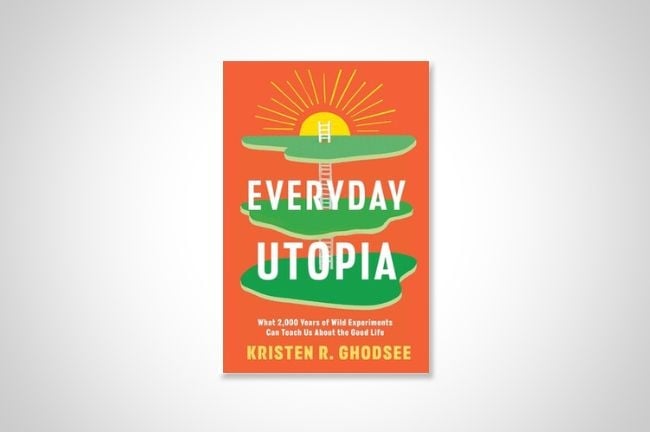You have /5 articles left.
Sign up for a free account or log in.

Simon & Schuster
Everyday Utopia: What 2,000 Years of Wild Experiments Can Teach Us About the Good Life by Kristen R. Ghodsee
Published in May 2023
In Everyday Utopia, Penn professor Kristen Ghodsee observes that today’s college students are struggling. We don’t know why a historically high percentage of students is self-reporting challenges with anxiety and depression.
What is clear is that, across the higher education ecosystem, the supply of mental health services is not keeping up with demand.
One theory for the distress college students are experiencing is that they are responding rationally to their circumstances. Students likely leave college with high levels of debt. Current and recent students have lived through a pandemic. They will graduate into a housing market that they can’t afford and a future of extreme weather, dangerous heat waves, flooding, fire and other climate-driven catastrophes. Who wouldn’t be depressed and anxious?
In Ghodsee’s scholarly and deeply personal Everyday Utopia, the antidote to despair is to think differently about our futures. She implores her readers to learn from past efforts at intentional communities and nontraditional family arrangements to claw back agency in determining life choices.
In Everyday Utopia, we find numerous examples of people who refuse to let the status quo of social relationships and community structures determine how they live. Ghodsee provides in-depth discussions of historical and current intentional groupings, such as kibbutzim (the plural of “kibbutz”) and co-housing communities.
The word “utopia” was coined by Thomas More in 1516, and in Everyday Utopia, we learn about the history (from Plato to The Handmaid’s Tale) of utopian and dystopian ideas.
Ghodsee is unafraid to take on traditional family and social arrangements (such as marriage and monogamy), arguing that these structures have historically served to subjugate women and privilege high-status men.
Suppose I were privileged to attend a dinner party with Ghodsee. In that case, I’d ask her to further expand on some of the ideas she brings up in Everyday Utopia related to academic life.
Could some of the benefits of intentional communities that Ghodsee describes (such as shared resources and dense social networks) be achieved by expanding the residential college?
Why should students be the only people who get to live on a college campus, enjoying all the learning and living benefits that student life provides? Surely, the model of Lasell Village, a senior living community at Lasell University in Newton, Mass., can be expanded.
Why restrict residential campus living opportunities to the young and the old when all ages and family compositions would benefit from access to professors, classrooms, dining halls, athletic centers and libraries?
What are you reading?




